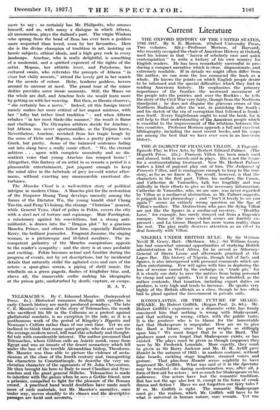TELEMACHUS: By C. Edmund Maurice. (Independent Press. 6s.)-:—Historical romances dealing
with episodes in early Church history are rarely produced nowadays. The late C. E. Maurice's version of the story of Telemachus, the monk who sacrificed his life in the Coliseum as a protest against gladiatorial combats, is no exception to the rule, as it is a posthumous work of the period of Kingsley's Hypidia and Newman's Callista rather than of our own time. Yet we are inclined to think that many quiet people, who do not care for the average modern novel, will read this scholarly and thought. ful tale with considerable interest. The author presumed that Telemachus, whom Gibbon calls an Asiatic monk, came from Egypt and was an inmate of the desert monastery which fell under the ban of the terrible Alexandrian bishop, Theodorus. Mr. Maurice was thus able to picture the violence of secta- rianism at the close of the fourth century and, transporting his characters to' Constantinople, to describe the very un- christian character of the opponents of St. John Chrysostoth. He then brought his_ hero to Italy .to meet Claudian Lind Synk- machus and the great general Stilicho. Telemachus is made to interfere with the games when he sees a Gothic friend, now a prisoner, compelled to` fight for the pleasure of the Roman crowd. A practised hand would doubtless have made much more of such materials, but Mr. Maurice's narrative, one Under way, moves steadily to its climax and the descriptive passages are lucid and accurate: - ".






































 Previous page
Previous page